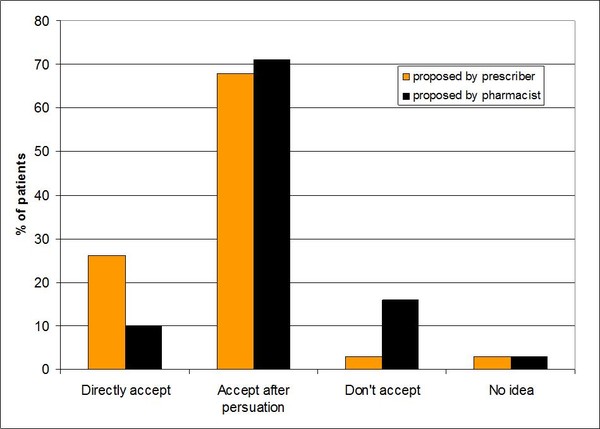Prescribers, pharmacists and patients in Turkey lack knowledge about generics. They may also be misinformed about generics, which can cause hesitation about the use of these drugs, according to Toklu and co-authors from the University of Istanbul, Turkey [1].
The study by Toklu and co-authors was conducted by a face-to-face questionnaire with patients, pharmacists and prescribers in the Kadikoy district of Istanbul in April 2010 in order to determine their knowledge and attitudes regarding the use of generics. The study included 101 patients, 68 pharmacists and 56 prescribers.
Of the 101 patients that completed the study, 19% thought that generics substitution should be initiated with the first prescription, while 12% thought that it was relevant for prescription refills. Of the 68 pharmacists that took part 30% thought that generics substitution may be performed in new prescriptions, 13% for prescription refills and 33% in any prescription. Patients were also more likely to accept generics substitution if it was proposed by a physician rather than a pharmacist, with 81% of patients accepting generics substitution by the pharmacist (10% without persuasion) compared to 94% accepting it when proposed by the prescriber (26% without persuasion), see Figure 1.
Figure 1: Patients’ acceptance of generics substitution in Turkey
Almost half (45%) of the patients thought that generics were cheaper than the originator drug, while 19% believed that there was no difference in price. Cost was the most important factor taken into consideration about generics substitution (92% for prescribers; 83% for patients and 82% for pharmacists).
Both pharmacists and prescribers believed that their role in promoting generics substitution was essential. Pharmacists put 97% of the responsibility on the prescriber and 91% on the pharmacists, while prescribers believed 94% of the responsibility to fall on the prescriber and 77% on the pharmacist.
Despite some positives, the authors concluded that the results of the study revealed the doubts that patients, pharmacists and physicians have about generics. The authors therefore, called for the health authorities and reimbursement institutes to cooperate with pharmacists and prescribers’ medical associations for educational programmes and to promote the more rational use of generics.
Conflict of interest
The authors of the research paper [1] declared that there were no conflicts of interest.
Editor’s comment
Readers interested to learn more about patient perspectives on generics substitution are invited to visit www.gabi-journal.net to view the following manuscripts published in GaBI Journal:
A review of patient perspectives on generics substitution: what are the challenges for optimal drug use
If you are interested in contributing a research paper in a similar area to GaBI Journal, please send us your submission here.
Related articles
Australian patients ‘very positive’ about generics
Turkish guidelines for generics
Patients do not talk about generics with doctors
Reference
1. Toklu HZ, Dülger GA, Hıdıroğlu S, Akici A, Yetim A, Gannemoğlu HM, et al. Knowledge and attitudes of the pharmacists, prescribers and patients towards generic drug use in Istanbul - Turkey. Pharm Pract (Granada). 2012;10(4):199-206.
Permission granted to reproduce for personal and non-commercial use only. All other reproduction, copy or reprinting of all or part of any ‘Content’ found on this website is strictly prohibited without the prior consent of the publisher. Contact the publisher to obtain permission before redistributing.
Copyright – Unless otherwise stated all contents of this website are © 2014 Pro Pharma Communications International. All Rights Reserved.








 0
0












Post your comment